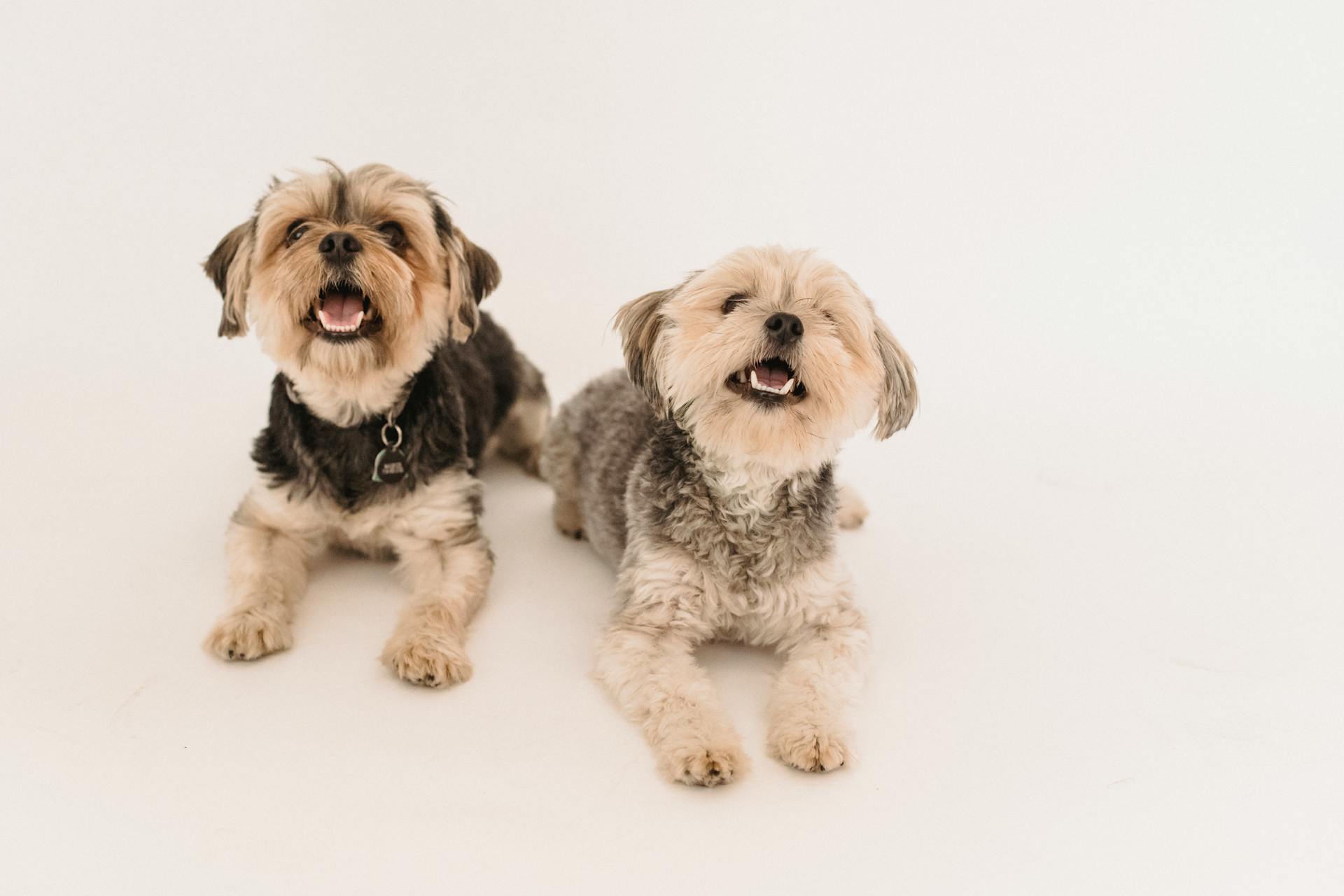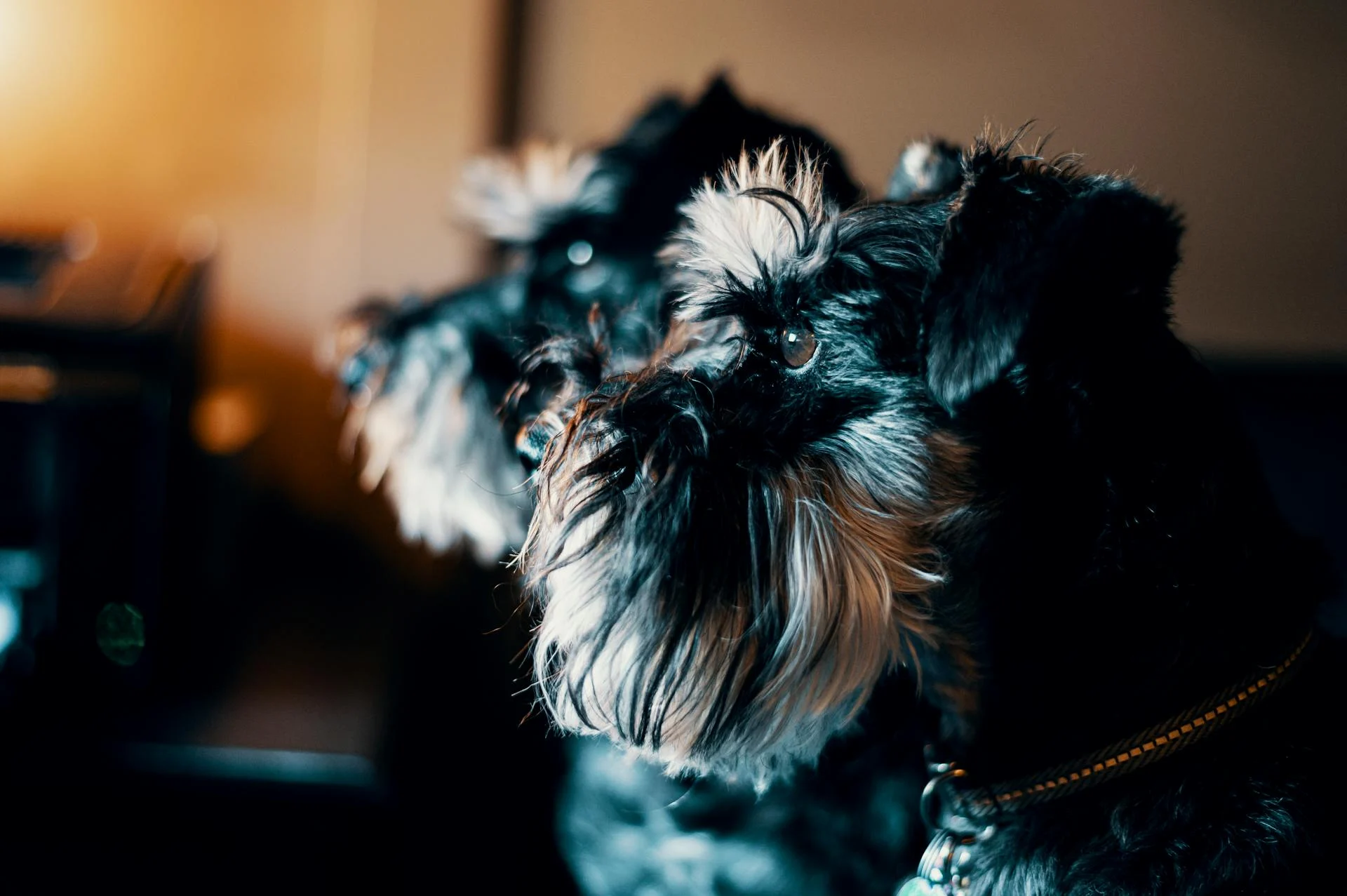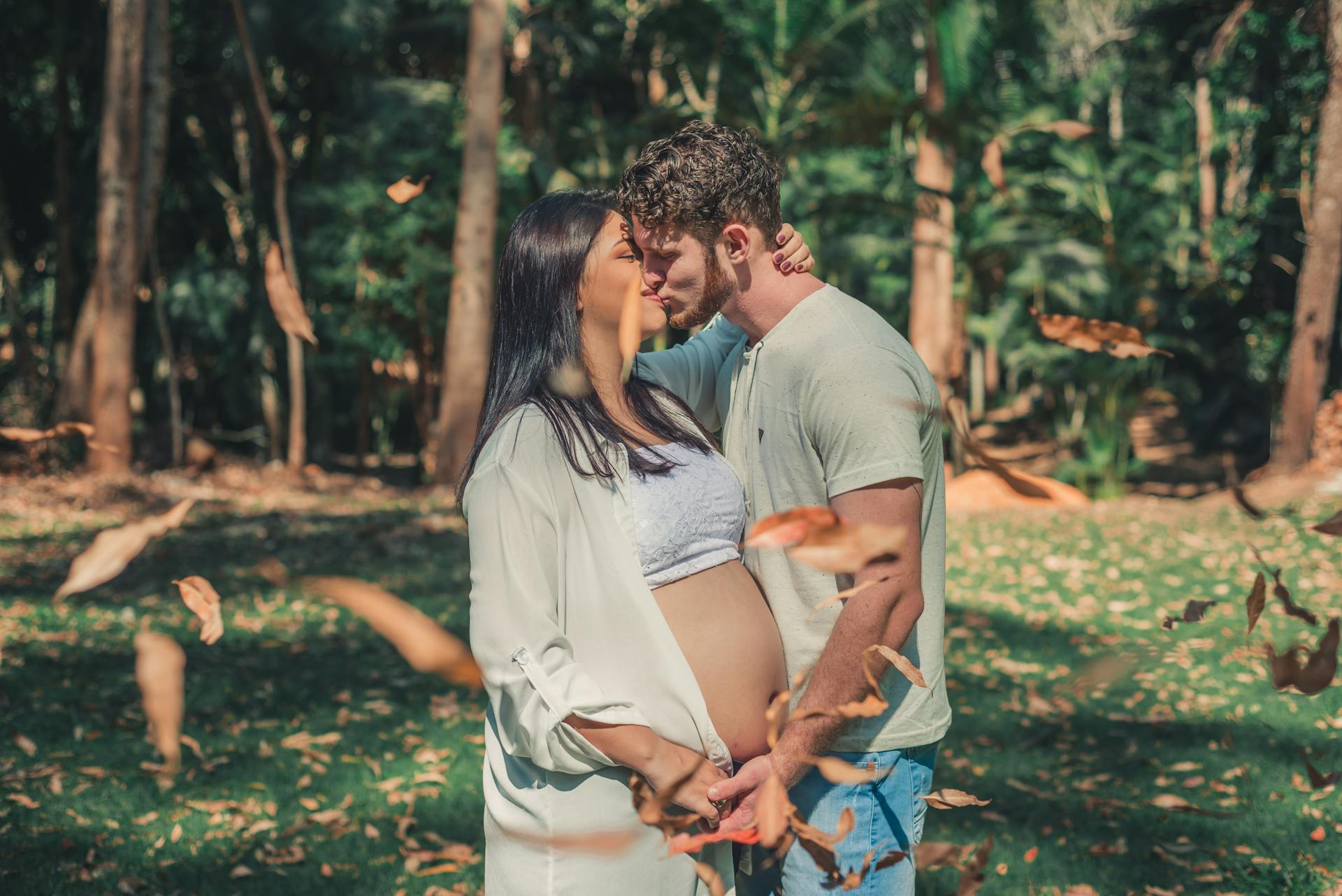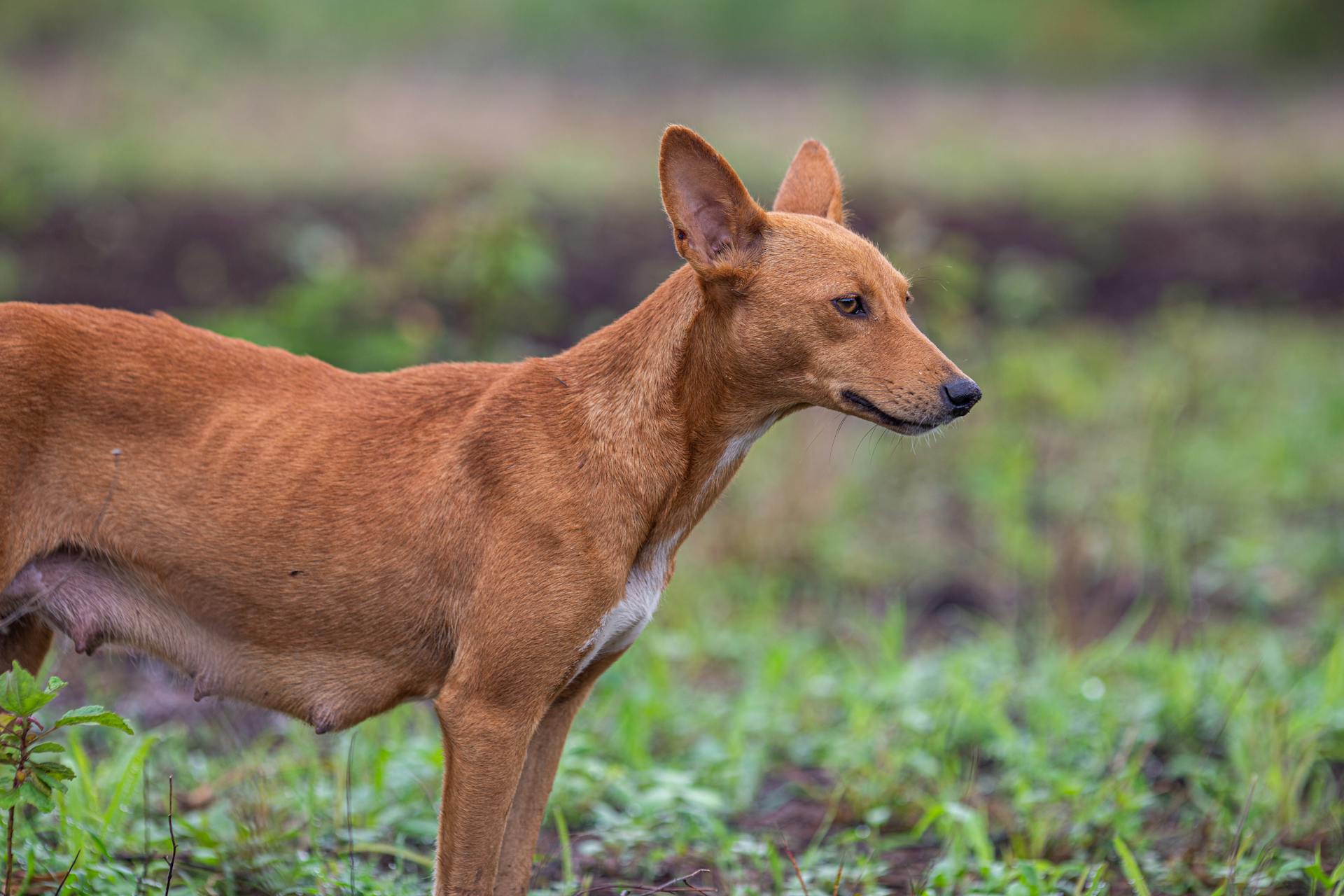
Congratulations on your Yorkshire Terrier's pregnancy! A Yorkshire Terrier's pregnancy typically lasts around 58-68 days, which is relatively short compared to other breeds.
During this time, your pet will experience significant physical changes, including weight gain, a swollen abdomen, and a decrease in activity level.
It's essential to monitor your dog's weight closely, as excessive weight gain can lead to complications during pregnancy and delivery.
As the due date approaches, you can expect your Yorkshire Terrier's labor to begin, with contractions becoming more frequent and intense.
A fresh viewpoint: Average Weight for Yorkshire Terrier
Signs of Pregnancy
As you're expecting a litter of adorable Yorkie puppies, it's essential to recognize the signs of pregnancy in your furry friend.
One of the earliest signs of pregnancy in Yorkies is a decrease in appetite, but later on, their appetite will increase, and they'll start eating way more than usual. This is a clear indicator that they're pregnant and will soon be meeting their new babies.
As the pregnancy progresses, you might notice that your Yorkie's belly becomes firmer, and they'll start to collect things to create a "nest" - a common behavior in pregnant dogs. They might also start grooming themselves more than usual, which is a sign of nesting instinct.
Here are some common signs of pregnancy in Yorkies:
- Decrease in appetite (initially)
- Increased appetite and weight gain
- Firmer belly
- Nesting behavior (collecting things to create a "nest")
- Grooming themselves more than usual
Keep in mind that every dog is unique, and not all Yorkies will exhibit all of these signs. However, if you're concerned about your dog's health or suspect that she might be pregnant, it's always best to consult with a veterinarian for an accurate diagnosis.
A fresh viewpoint: Yorkshire Terrier Names
Preparing for Puppies
As your Yorkshire Terrier's pregnancy progresses, you'll want to prepare for the arrival of her puppies. Around day 50 or so, start preparing a whelping box large enough for your pregnant Yorkie and her puppies to be comfortable. The whelping box should be easy for the mother, but not the puppies, to get in and out of.
You might enjoy: Biewer Yorkshire Terrier Puppies
You'll want to line the whelping box with many layers of newspapers and soft cloths that are clean but can get soiled without concern. Introduce your Yorkie to the whelping box, and keep phone numbers of your vet and an emergency clinic nearby. As birth nears, your Yorkie may become very restless, may stop eating, may vomit, and may cry in pain.
Puppies can come quickly or up to two hours apart. If more than two hours pass and you know there are more puppies, contact your vet for advice. To ensure everything goes smoothly, it's a good idea to have another person with you to help keep the puppies warm or to assist if you need help.
Here's a list of essential items to have in your whelping box:
- Lots of newspaper to line the whelping box during delivery for easy cleanup
- Non-skid bath mats for bedding after whelping is done
- Dry, clean towels to clean the puppies
- Paper towels to help with clean up
- Thermometer to check your dog’s temperature before whelping
- Clean, sterilized scissors to cut the umbilical cords
- Unwaxed dental floss to tie off the umbilical cords
- Iodine to clean the puppies’ abdomens after the cord is cut and dab on the end of the cut umbilical cord
- Heat lamp set high above the box on one corner only to allow the puppies to crawl to a cooler spot in a box or hot water bottle to keep the puppies warm
- Bulb syringe to clean puppies’ nose and mouth
- A baby scale in ounces
- Honey or light corn syrup
- Veterinarian’s phone number and the number of a nearby emergency clinic
Pregnancy and Labor
Confirming pregnancy can be challenging, but look for signs like a tired Yorkie, enlarged nipples, nesting behavior, and a firmer belly. These signs usually become more noticeable between weeks 3 and 4 of pregnancy.
A typical Yorkie pregnancy lasts around 63 days, but can range from 58 to 68 days. If it's past 68 days, consult a veterinarian to ensure everything is okay.
During pregnancy, your Yorkie's appetite will increase, and she'll need high-quality food to ensure she gets enough nutrients. Aim for a balanced diet that's specifically designed for pregnant dogs, and consult your vet for guidance on portion sizes.
As the pregnancy progresses, your Yorkie will start nesting, which means she'll lay down in a cozy place to rest and relax. Keep an eye on her physical activities, but make sure she gets some walks to stay in good shape.
Around day 50 or so, prepare a whelping box for your Yorkie. This should be a safe, warm, and easily cleaned space for her to give birth and nurse her puppies. Introduce her to the box before labor to ensure she feels comfortable there.
During labor, your Yorkie may become restless, stop eating, vomit, and cry in pain. Puppies can come quickly or up to two hours apart, so be prepared for a potentially long process. If more than two hours pass and you know there are more puppies, consult your veterinarian for advice.
You might enjoy: Maltese Terrier Mix Puppies
The most accurate way to determine if a dog is pregnant is through diagnostic testing, including palpation, ultrasound, hormone tests, and X-rays. These tests can detect the presence of puppies, estimate their number, and help you prepare for labor.
Here's a summary of the pregnancy stages and corresponding signs:
Keep in mind that every dog is unique, and individual needs may vary. Consult with a veterinarian who's familiar with Yorkies and experienced in canine reproduction to ensure the best care for your pregnant Yorkie and her puppies.
Proper Nutrition
As your Yorkshire Terrier prepares for motherhood, it's essential to ensure she receives proper nutrition to support her health and the growth of her puppies. A high-quality dog food is a great starting point, and if your dog is already on a good quality food and is at a healthy weight, you won't need to make any changes for the first two-thirds of her pregnancy.
However, as her weight increases in the last weeks of her pregnancy, veterinarians recommend increasing her food intake gradually, until she consumes 35-to-50 percent more than usual. It's best to increase her intake slowly and feed her small, frequent meals, as large meals can cause discomfort.
A malnourished mother will suffer reproductive consequences, as will her puppies. Obesity is the most common nutrition-related problem in reproducing dogs, and it can cause increased intervals between estrus cycles, decreasing lifetime reproductive capacity.
To provide the best nutrition for your pregnant Yorkie, feed a high-quality and balanced diet that is specifically designed for pregnant dogs. Yorkies have small frames, so consult your vet for appropriate portion sizes. Increase food gradually as pregnancy progresses, and ensure the diet is rich in essential nutrients, including calcium and folic acid.
Here's a rough guide to increasing your Yorkie's food intake during pregnancy:
Note: These are general guidelines, and your vet may recommend a different plan for your Yorkie's specific needs.
Breeding and Health
Breeding a Yorkshire Terrier requires careful consideration of the health implications for both the mother and the puppies.
Genetic problems such as osteoarthritis and hip dysplasia should be avoided at all costs, as they can be passed on to the puppies.
Inbreeding is a major concern, as it increases the likelihood of recessive genes being expressed, leading to a range of health problems.
Before breeding, it's essential to ensure the mother is healthy and free from degenerative issues or serious health problems.
Physical defects, such as a poorly developed jaw, can also be inherited and cause problems for the puppies.
To minimize the risk of health problems, regular veterinary visits are crucial during pregnancy.
A prenatal checkup with the vet can help identify any potential issues and ensure the mother is up-to-date on vaccinations.
A fecal exam or de-worming medication may be recommended to prevent intestinal parasites.
It's also essential to consider the economic implications of breeding, including the cost of veterinary care, food, and baby formula milk.
Intriguing read: Yorkshire Terrier Diseases Common
Here are some key health considerations to keep in mind:
Breeding Considerations
Breeding a Yorkshire Terrier requires careful consideration of several factors to ensure the health and well-being of both the mother and the puppies.
Genetic health is crucial, and inbreeding should be avoided as it increases the likelihood of genetic deterioration in the offspring.
Healthy individuals are essential, and breeding a Yorkshire Terrier with degenerative issues or serious health problems can lead to genetic problems being passed on to puppies.
Physical defects, such as a poorly developed jaw, can be inherited and detrimental to the puppy's future development.
Delivery problems can arise, and it's essential to be aware of potential pregnancy complications and have a plan in place with your veterinarian.
Responsibility for the puppies is a significant consideration, and breeders should be prepared to care for the puppies and ensure they find good homes.
Puppies can be delicate, and improper care can lead to health problems or even death.
Broaden your view: Yorkshire Terrier Puppy Care
Economic solvency is also important, as medical complications and large litters can be costly.
- Age: Younger and older dogs might have smaller litters.
- Health: Dogs in good health are more likely to have larger litters.
- Size: Larger dogs might have more space in their uterus for multiple puppies, potentially resulting in larger litters.
- Genetics: Genetic factors play a role in determining litter size.
- Number of eggs released: The number of eggs released during the heat cycle can affect litter size.
- Hormones: Hormonal factors can impact fertility and litter size.
- Nutrition: Proper nutrition before and during pregnancy is crucial.
- Stress: Stress can have a negative impact on fertility and overall reproductive health.
- Previous litters: A dog's previous litter size might be an indicator of future litter size.
- Breeding timing: Successful mating during the optimal time in the female dog's heat cycle increases the chances of fertilization and larger litter size.
Should I Spay?
Spaying is a decision that should be made in consultation with a veterinarian and based on individual circumstances. It's essential to consider the potential benefits and risks, especially for smaller breeds like Yorkies.
Spaying can prevent unwanted pregnancies and reduce the risk of certain reproductive health issues. This is a significant consideration for many dog owners.
Reducing the risk of certain cancers is another potential benefit of spaying. This is an important factor to discuss with your veterinarian.
The timing of spaying should be discussed with a veterinarian to balance the health benefits with the potential impact on growth and development. This is especially crucial for smaller breeds.
Ultimately, the decision to spay should be based on the dog's individual health, lifestyle, and the guidance of a veterinary professional.
Pregnancy and Health
During pregnancy, it's essential to monitor your Yorkie's health closely. A pregnant Yorkie will typically experience an increase in appetite and weight gain, as well as a swollen belly and firmer nipples.
Recommended read: Yorkshire Terrier Yorkie Adoption
To ensure your Yorkie stays healthy, provide a high-quality and balanced diet that is specifically designed for pregnant dogs. This diet should be rich in essential nutrients, including calcium and folic acid. It's also crucial to discuss with your vet whether supplements are needed.
To keep track of your Yorkie's health, schedule regular prenatal check-ups with your vet. These check-ups will help monitor the pregnancy and detect any complications early. Additionally, keep an eye on your Yorkie's behavior, appetite, and energy levels, as changes in these areas can indicate impending labor.
Here's a summary of the key signs of pregnancy in Yorkies:
- Increase in appetite
- Weight gain
- Increase in nipple size
- Swollen belly
- Tires more easily
- Nesting behavior
- More affectionate
- Irritability
Regular veterinary check-ups are crucial to monitor the pregnancy and detect any complications early.
Pregnancy: Post Partum
The post-partum period for your Yorkie is a crucial time for her recovery and the health of her puppies.
After delivering, it's essential to clean your Yorkie and let her rest, as she's had a rough time and needs all the sleep she can get.
You should place the puppies somewhere warm, as they need a safe and cozy environment to grow and thrive.
Call your vet to check on the puppies and get instructions on what to do next, as they'll be able to provide you with personalized advice and guidance.
The next few weeks are critical for the wellbeing of the pups, and educating yourself on this topic will help ensure they grow healthy and strong.
If you follow your vet's instructions, you can rest assured that your puppies will be in good hands and will have the best chance at a healthy start in life.
Caring for a Pregnant Dog
Caring for a pregnant dog requires attention to her specific needs, especially since Yorkies are small in size.
It's essential to consult with a veterinarian before breeding to ensure your Yorkie is in good health for pregnancy. They'll perform necessary health checks and vaccinations.
Feed a high-quality and balanced diet specifically designed for pregnant dogs, and consult your vet for appropriate portion sizes. Increase food gradually as pregnancy progresses, and ensure the diet is rich in essential nutrients like calcium and folic acid.
Related reading: Pregnant Cats
Regular veterinary check-ups are crucial to monitor the pregnancy, detect any complications early, and ensure the health of the mother and puppies. Schedule prenatal check-ups with your vet starting from the first few weeks of pregnancy.
A pregnant Yorkie needs to stay in good shape through moderate exercise, avoiding excessive strain. Short walks are preferable closer to delivery to prevent exhaustion.
Create a quiet, comfortable space for your pregnant Yorkie to rest, and provide a nesting area with soft bedding. Regular grooming is also essential to keep her coat and skin healthy.
To confirm pregnancy, look for signs like a more tired or grumpy demeanor, larger nipples, nesting behavior, increased grooming, and a firmer belly. These signs become more noticeable between weeks 3 and 4.
A pregnant Yorkie's diet is crucial, and she'll need a high-quality food that provides essential nutrients. Avoid giving her supplements without consulting your vet.
As the pregnancy progresses, ensure she has a comfortable place to rest and relax, and monitor her physical activities to prevent excessive strain. A pregnant Yorkie still needs regular walks to stay healthy.
Here's a list of essential care for a pregnant Yorkie:
- Feed a high-quality and balanced diet specifically designed for pregnant dogs
- Consult your vet for appropriate portion sizes
- Schedule regular prenatal check-ups with your vet
- Provide a comfortable and quiet space for her to rest
- Monitor her physical activities to prevent excessive strain
- Ensure access to fresh water at all times
- Keep stress levels low and maintain a calm environment
Frequently Asked Questions
How many puppies does a Yorkie have the first time?
A Teacup Yorkie's first litter typically ranges from 1 to 4 puppies, influenced by genetics, health, and breeding practices. Understanding these factors can help you better prepare for your first litter.
How long is a Yorkies pregnancy?
A Yorkie's pregnancy typically lasts around 63 days from conception, but can vary by a few days due to the difficulty in determining exact conception timing.
Can Yorkies give birth on their own?
Most Yorkies can give birth on their own without assistance, but it's essential to be prepared for potential complications that may require veterinary help. If you're expecting a Yorkie litter, it's best to have a plan in place for monitoring and support.
How old does a Yorkie have to be to have babies?
A female Yorkie should be at least 2 years old and a male Yorkie over 1 year old to be considered for breeding, but there's more to consider before deciding to breed your dog
How long does it take a Yorkie to deliver puppies?
Yorkie pregnancies typically last between 56-70 days, with an average gestation period of 63 days. For a more detailed understanding of your Yorkie's pregnancy and delivery, please see our full guide to dog pregnancy and childbirth.
Sources
- https://www.akc.org/expert-advice/dog-breeding/dog-pregnancy-care-prep/
- https://vcahospitals.com/know-your-pet/feeding-the-pregnant-dog
- https://www.animalwised.com/how-many-puppies-can-a-yorkie-have-257.html
- https://yorkies-gram.com/everything-you-need-to-know-about-yorkie-pregnancy/
- https://www.cuteness.com/article/yorkie-pregnancy-stages
Featured Images: pexels.com


